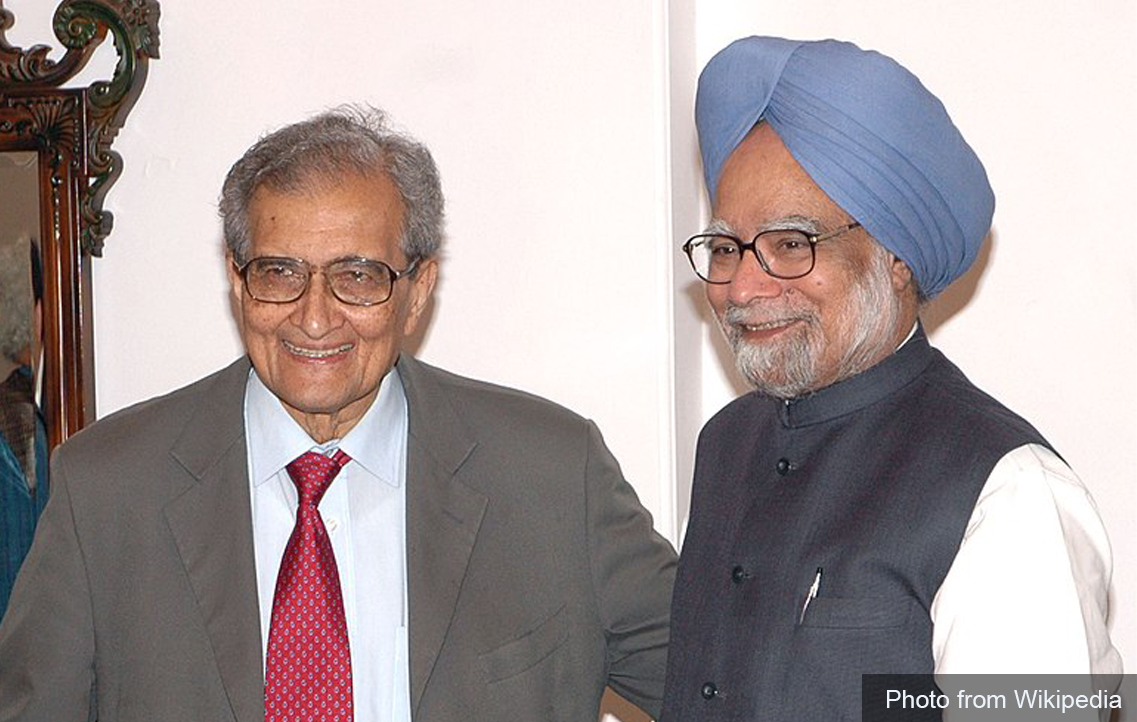
Amartya Sen, who received the Nobel Prize for Economics in 1998, recently published Home in the World: A Memoir. It is strong on autobiographical details, such as the years he spent at Rabindranath Tagore’s Viswa-Bharati educational institution in India’s Santiniketan, his undergraduate years at Calcutta’s premier Presidency College, and his time at Trinity College, Cambridge, whose first Asian Master he would become.
However, the book also is an intellectual autobiography of the best kind because it reveals the cerebral jousting that made Sen a globally known public intellectual, an achievement highlighted in 1998 by the award of the Nobel for his contributions to welfare economics.
The book is a wistful delight to read, not least because it recalls an era of intense debate on the economic past, present and future of the world.
Sen, who went to Trinity in 1953, entered a volatile world torn at the intellectual top among disciples of the neoclassical and neo-Keynesian schools.
Neoclassical economics is usually described as a theory that focuses on supply and demand as the driving forces behind the production, pricing and consumption of goods and services. (The “neo” in its name refers to its competition with earlier, classical theories of economics). By contrast, neo-Keynesian theory, which focuses on economic growth and stability rather than full employment, builds on the insights of the great Cambridge economist John Maynard Keynes and refuses to identify the market as being self-regulating.
Sen stepped into this gulf between the two dominant schools at Cambridge and encountered the arguments of Marxist economists as well.
“The Keynesians were perceived to be to the left of the followers of neoclassical economics, but this was very much in the spirit of ‘thus far but no further’, since neo-Keynesians were firmly opposed to Marxists and other clearly left-wing schools of thought,” Sen writes. There was no clear progression from left to right.
For example, the eminent Marxist Maurice Dobb, one of Sen’s chief influences at Cambridge, was often considered by neo-Keynesians to be soft on the neoclassicals. “Soft or not, my observations indicated that there was often more room for friendly relations between Marxists and neoclassical economists, than between neo-Keynesians and neoclassical economists.”
In other words, the contested overlap between competing schools of thought produced no grand synthesis but an open war of attrition. What occurred in the process was a sharpening of economic understanding of where the public good lay. For Sen, the way forward lay in social choice theory and, through it, to the destination of welfare economics. The trinitarian struggle between neo-classicals, Keynesians and Marxists produced Sen.
At Presidency College in Calcutta, Sen had been a student activist on the left without having joined any political party. That is because his belief in the absolute need for equitable economic relations among humans was complemented by his equally intransigent faith in the irreducible need for the liberty of those humans. His refusal to join a communist party reflected his lament that Stalinism was “obliterating the promise of freedom that communism had initially proclaimed”. Yet, Sen’s refusal to throw out the baby Marx with the Stalinist bathwater gave him new insights into the politics that determine economics.
Here, again, was an inability to take partisan sides without considering and respecting alternative and intermediate positions.
A veritable war of ideas, waged between different visions and versions of the political good, was being played out within Sen, without his capitulation to any one position competing for hegemony. His autonomy marks the intellectual apogee of the book. His refusal to become a Marxist is perhaps the greatest tribute that a human has paid to Marx, at least in South Asia. It prevented another ghastly Stalinist misreading of Marx.
Today, the problem is different. There are many autonomous intellectuals, but there is not much for any of them to be autonomous from.
Stalinism is long gone, but other isms have replaced it, particularly secular neoliberalism and a variety of murderous religious isms. Even the advent of COVID-ism has not produced a thinker in the original mould of Sen. How does a triumphant economic, religious or epidemiological phenomenon change human perceptions of the world’s ecological fragility? What needs to be done to protect the only home that every human has?
The modern pursuit of the science of economics has been hobbled by externalities, or what lie outside the recognised economic sphere. Is the coronavirus pandemic an externality? Surely not. Surely then, what is necessary to meet the challenge of COVID-19 is an expansive idea of economics that lies at the very heart of public policy.
Looking beyond COVID-19, if ever such a time comes, it is essential for both public policymakers and citizens to go beyond the strictures of neoliberal economics, the dominant school guiding the practice of globalisation today, and examine the possible contribution that other economic theories could make — theories that lie close to environmental sustainability, gender equity, and human emancipation from both the economic need and liberal political deficit in global affairs.
The more catholic the understanding of economics, the better public policy would be. To read Sen’s autobiography is to have the faith to embark on that task.
The author is co-general editor of the Singapore Chronicles series published by IPS and The Straits Times Press.
Top photo from Wikipedia.
